Badugi Beginners Guide
Strictly speaking, our beginner´s guide to Badugi Poker is not only for beginners – if it was, we would have finished the page about half way down. In addition to explaining what is Badugi Poker and how to play the game, we also look at some strategies you may want to consider when playing Badugi (also known as Padooki Poker, Paduki Poker or Badougi Poker) and the odds of getting the card(s) you need to make your Badugi Poker experience profitable.
Like any game of poker, Badugi is not only about the cards you are dealt. The players you are seated with, your position and bluffing in Badugi are equally important. Consequently we have also included a section in our Beginner´s Guide to Badugi Poker about how to take advantage of weaknesses you identify in your opponents´ play. We hope you enjoy reading our Badugi Beginners Guide and can use our tips to enhance your Badugi Poker bankroll.
What is Badugi Poker?
Badugi is a draw poker game similar to Triple Draw (i.e. there are no community cards like in Texas Hold´em Poker) in which the players try to get the lowest value four-card hand comprising of four different suits. In order to achieve this feat (known as a four-card Badugi), there are three drawing rounds in which players can trade between zero and four cards from their hand for new cards from the deck.
It is not always necessary to make a four-card Badugi in order to win the pot. In short-handed games, it is less likely that a four-card Badugi will be made. Consequently players can still win the pot with a lesser set of cards (see our Badugi hand rankings below) or by using their position and bluffing skills to bet every other player out of the pot. Because of the opportunities to improve a hand with every draw, there is usually plenty of action at Badugi Poker tables.
How to Play Badugi
Before each hand starts, blinds (and sometimes antes) are paid into the pot by the players sitting to the left of the dealer. Four cards are dealt to each player face down, and a round of betting (usually Fixed Limit) takes place before the first exchange of cards. During the first round of betting, players have the option of paying a bet equivalent to the big blind, raising the pot by the amount of the big blind or folding their cards. The pot can usually be raised four times before betting is capped.
The exchange of cards starts with the player to the left of the dealer discarding any cards they do not want from their hand and receiving new ones from the pack. The exchange of cards continues in a clockwise direction until every player has had the opportunity to discard and replace unwanted cards. A further round of betting follows after which there is another exchange of cards. Players have the option of checking, raising, calling another player´s raise or folding their cards.
A second and third exchange of cards takes place, and after each exchange there is a further round of betting. When betting has concluded after the final exchange of cards, the players left in the hand reveal their cards. The player with the best hand collects the pot, after which the dealer´s button moves one seat to the left and the next hand of Badugi Poker is dealt.
Badugi Hand Rankings
With the object of the game being to be the player with the best hand of cards, it is important to know the Badugi hand rankings. As mentioned during our section on “What is Badugi Poker?” the winning hand is most often the lowest value four-card hand comprising of four different suits. Consequently the best Badugi Poker hand would be {A♠} {2♣} {3♦} {4♥} in any combination of four different suits.
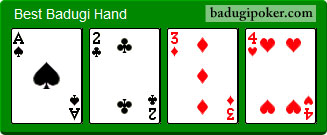
What players have to try to avoid is paired cards and two or more cards in the same suit, because these will be discounted at showdown. A hand consisting of {A♠} {2♣} {3♦} {4♦} becomes {A♠} {2♣} {3♦} X (the highest value Diamond being discounted) and is known as a three-card Badugi. It would be beaten by any four-card Badugi – such as {5♠} {7♣} {10♦} {K♥}. Similarly, if a player were to have {A♠} {A♣} {2♦} {2♥}, this would become {A♠} {2♦} X X and would be beaten by any three or four-card Badugi.
When two players or more have four-card Badugis, the winner of the pot is determined by the lowest “High Card”. So a player holding {2♦} {4♥} {7♣} {8♠} would beat a player showing {A♠} {2♣} {3♦} {10♥}.
This 4 card badugi hand has the lowest high card (8♠) and wins
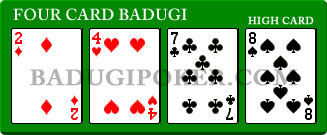
from the following hand which has a higher high card (10♥):
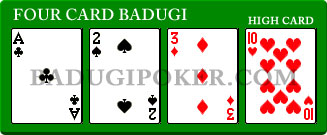
If the lowest “High Card” in both hands is the same, the next-highest card is considered. Therefore {2♦} {4♥} {6♣} {8♠} would beat {2♣} {4♠} {7♦} {8♥}.
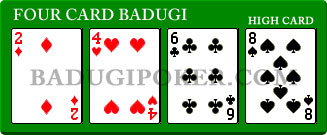
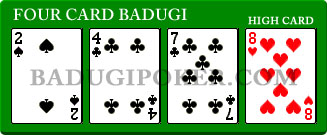
Badugi Strategy for Starting Hands
Bearing in mind what we are about to say (below) about Badugi odds, and position and bluffing in Badugi Poker, this section on Badugi strategy simply focuses on starting hand selections.
As a rule, if two of the cards have a value of Four or lower, are off-suit and do not include pairs, this is considered to be a reasonably good starting hand. It is slightly better to have three unsuited and unpaired cards with a value of Seven or lower and, if a dealt hand comprises of four unsuited and unpaired cards with a value of Eight or lower, this is ideal.
Any other starting hand combination should generally be folded, unless weak players have been identified around the table who go into every hand and who may be vulnerable to a bluff. In many games of Badugi Poker we have observed, plenty of players limp into pots with hands that should have been folded during the first round of betting. Sometimes these players get lucky with a fortunate exchange of cards, but it is not a Badugi Poker strategy that we would recommend.
Badugi Odds
What is recommended is that players are aware of the odds of making a four-card Badugi with the cards that are dealt, because this will influence their betting actions. Badugi odds are calculated by working outs how many outs a player has and then dividing them into the number of cards that have not yet been seen.
For example: A player is dealt a starting hand of {A♠} {2♣} {3♦} {6♣}. In order to make a four-card Badugi, the player has to discard the {6♣} and hope it is replaced by a Heart. There are ten Hearts that would complete a four-card Badugi (excluding {A♥} {2♥} and {3♥} which would create a paired hand), so the odds of making a four-card Badugi on the first exchange are 10 (outs) divided by the 48 cards that have not yet been seen. 10/48 = 20.83%.
If the player fails to make a four-card Badugi on the first exchange, his or her odds of being dealt an out slightly improves on the second exchange. This is because there is one less unseen card remaining in the pack. Consequently, the odds for being dealt a card between {4♥} and {K♥} on the second exchange are 10/47 (21.28%) and on the third exchange are 10/46 (21.74%).
By adding all three percentages together (63.85%), a player can determine whether or not to continue in a hand during the first round of betting depending on the pot odds (the amount of money a player will have to pay into a pot to continue in the hand compared to their chances of winning) and the implied odds (how much more money a player will have to put into the pot after the three exchange rounds).
Players, Position and Bluffing in Badugi
Badugi odds, pot odds and implied odds should not be the only considerations to enter a Badugi player´s calculations. Naturally, the more often a player gets involved in a pot with the percentages on their side (known as +EV), the more profitable they will be playing Badugi Poker. However, the other players seated around the table, the player´s position and bluffing also play important roles in profitable Badugi.
In any game of poker, there will always be players who remain quiet for a while and then bet aggressively or players who limp into every hand and rely on the luck of the cards to create a winning hand. The key to being a profitable Badugi player is to identify these traits in other players and make it as difficult as possible for other players to identify any traits you may have.
Your position in the order of betting action is a very important consideration in Badugi. The player who is last to act has the most information available to them, and can make their betting decisions not only on the betting action that has gone on before their turn, but also by the number of cards players have discarded in the exchange rounds. Needless to say that if the player who acts before you has not exchanged a card and has raised in every round of betting, it is likely that they have a very strong hand.
It may also be the case that they are bluffing and trying to win the pot without the hand going to showdown, or – and this is an advanced Badugi strategy often used by profitable players – get caught bluffing; so that when they are dealt a very strong opening hand in the future they get maximum value from their cards due to other players thinking they are bluffing again.
Where to Play Badugi Online
Badugi Poker is not often played in live poker venues, and the best place to play Badugi online is at any of the major Internet poker sites which offers Badugi as an option. Badugi Poker is rapidly growing in popularity and more sites are beginning to offer Badugi online. We would suggest playing at an Internet poker site that already has a significant amount of online traffic.
